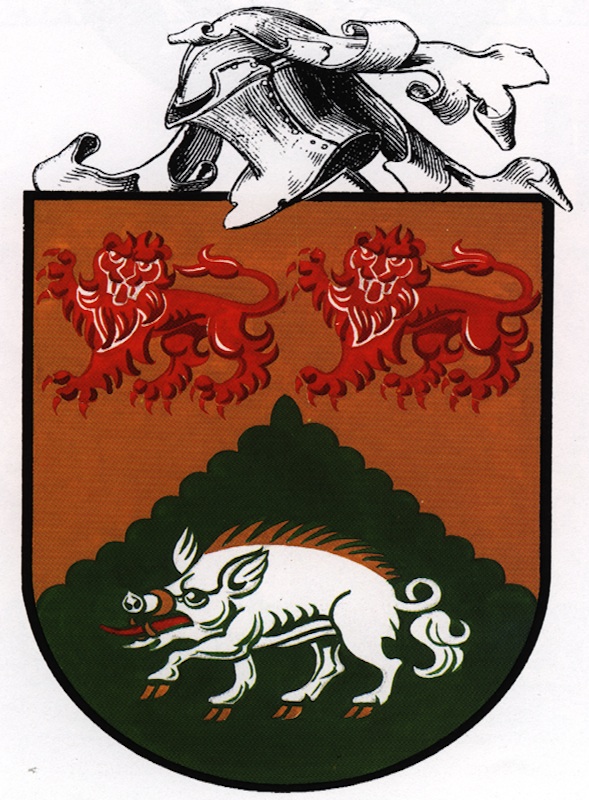McDonagh is one of the rarer surnames of Ireland, but exists also as MacDonagh, MacDonough, Donogh, and Donagh. The modern forms of the name are derived from Mac Donnchadha, which originates from the first name Donnchadh, a compound of “donn” meaning brown, plus “cath,” a battle. Often translated as “brown one,” Donnchadh was a common first name in ancient times. Given its popularity, the surname derived from it rose quickly through many regions of Ireland. These many sects of McDonaghs grew separately throughout the country, and thus there is not always a common thread between McDonagh clans.
The ancient McDonaghs were found mainly in Counties Cork, Galway, and other parts of Connacht. In Cork, the McDonaghs were a branch of the MacCarthy clan. They were known as the “Lords of Duhallow” and built Kanturk Castle. Construction began on this semi-fortified castle in about 1610, but was halted when the English government became jealous of the size and apparent strength of the structure. Never finished, the shell of the castle is known as “McDonagh’s Folly.”
A McDonagh family also rose to prominence in Connacht. These McDonaghs, a branch of the MacDermotts, claim Donagh MacDermott as an ancestor and ruled in the barony of Tirreril in ancient times. Their power was spread throughout Counties Sligo and Roscommon.
McDonagh or MacDonagh is, in most cases, a Connacht name and is today concentrated in Galway, Mayo and Roscommon.
A martyr for Irish independence, Thomas MacDonagh (1878-1916) was a gifted poet and a lecturer in University College Dublin. He is most remembered for his part in the 1916 uprising, during which he became a signatory of the Proclamation of Independence, and for which he was executed. A distinguished poet, he was highly regarded in Dublin’s literary community and was remembered after his death in the writings of his contemporaries, including W.B. Yeats. His son, Donagh MacDonagh (1912-68), was also a poet and dramatist, with three volumes of poetry and the classic play Happy as Larry.
Continuing the McDonagh tradition in the arts is Maitland McDonagh, a noted film critic and author of several books on cinema. Born into an Irish-American family, McDonagh was raised in New York City. Her emigrant grandparents were the proprietors of the Moylan Tavern, which was reincarnated as the Moylan Tavern of Fox’s The George Carlin Show. McDonagh teaches film at Brooklyn College and is author of Filmmaking on the Fringe and Movie Lust, the third in the Sasquatch book series, which includes Book Lust by Nancy Pearl.
Rounding off the clan’s theatrical contribution is playwright and director Martin McDonagh. London-born to Irish parents, his most famous plays are The Beauty Queen of Leenane and The Lieutenant of Inishmore. He won an Oscar in 2006 for best live-action short film for Six Shooter, and directed his first full-length movie, In Bruges, starring Colin Farrell and Brendan Gleeson, this year.
Upholding the McDonaghs’ sports tradition is Jenny McDonagh, who is a field hockey forward on the Belfast Harlequins team. She played for the Women’s National team in 2001 against England, as well as the Olympic and World Cup qualifiers in 2004 and 2006 respectively. The McDonaghs also have fine pugilists in the family. Peter McDonagh is currently fighting at lightweight. During the 1980s Seamus McDonagh was a popular cruiserweight who fought Evander Holyfield in 1990. Since putting the gloves away, Seamus has gone on to become an actor, and recently played the lead role in Shamrock Kid during its run in New York.
In the corporate world, CEO of HSBC NA and subject of this issue’s cover story, Brendan McDonagh, is blazing a trail in banking. The Dublin-born businessman heads the bank from its headquarters in Chicago. HSBC employs over 40,000 people in the United States.
The McDonagh name is popular in Galway, home of “McDonagh’s of Ireland.” Established in 1902, the restaurant is still owned by the original McDonagh family, and has become known around the world as the restaurant to visit in Galway. Presented with the “Best Bag of Chips [Fries] Award” in 2007, this famous spot even made it into the most recent version of the video game “Grand Theft Auto.”


You might also want to mention my father, Donald McDonagh (1932- ) a noted dance writer who reviewed for the New York Times, contributed to the influential magazine Ballet Review and wrote several books, including The Rise and Fall and Rise of Modern Dance (1970) and Martha Graham: A Biography (1973).
Fascinating article. The McDonagh name
was brought to Canada by me in 1970.
I have never met another McDonagh in Toronto, although I am sure that they exist..